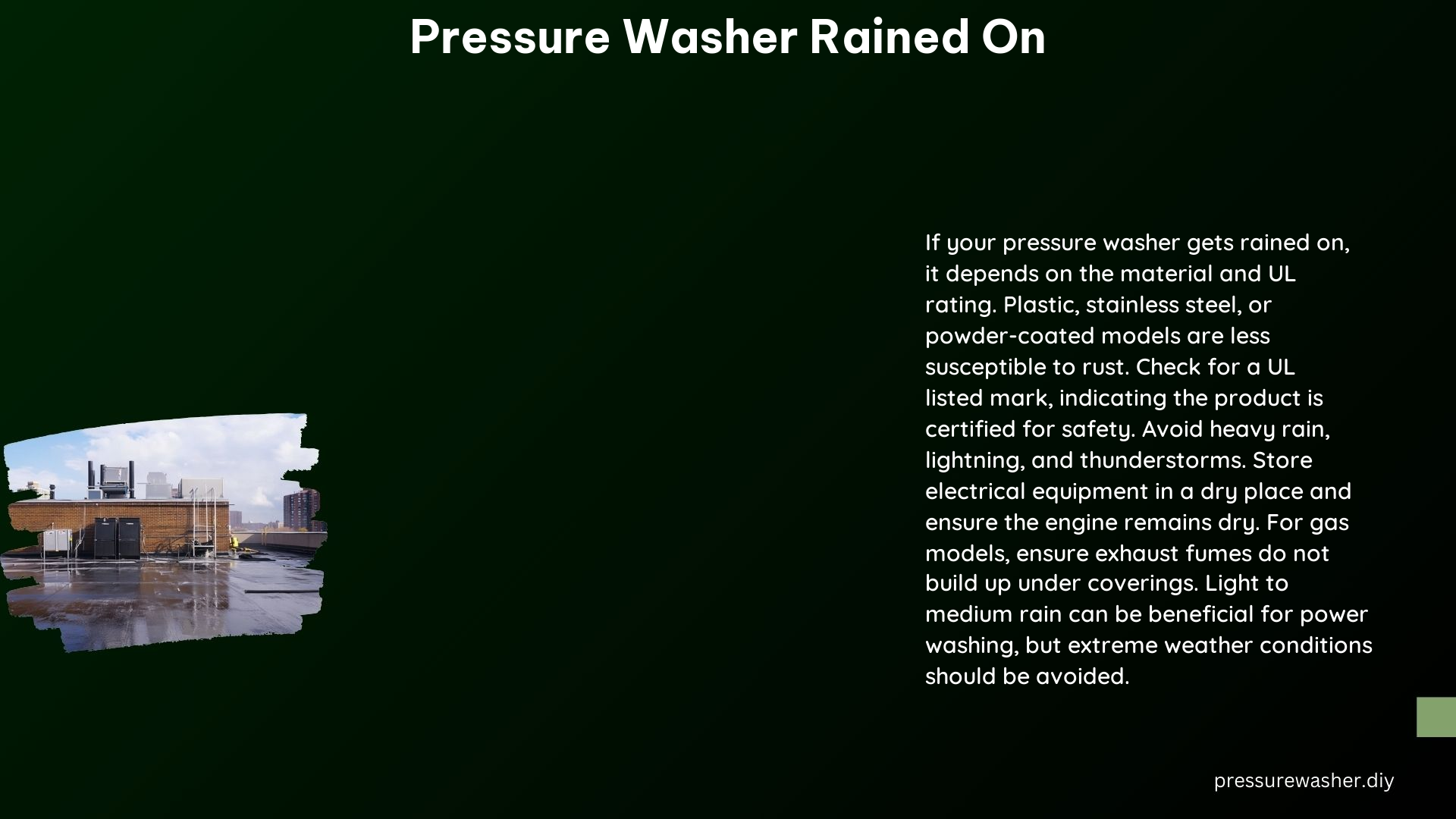Using a pressure washer in the rain can be a complex issue, with both advantages and safety concerns. This comprehensive guide will provide you with the technical details, safety precautions, and DIY tips to ensure you can use your pressure washer effectively and safely, even in light to medium rain conditions.
Can You Use a Pressure Washer in the Rain?
Yes, you can use a pressure washer in the rain, but it requires caution and adherence to safety protocols. Most pressure washers, when equipped with the proper safety features, can be used in light to moderate rain without issue. However, it’s crucial to ensure your equipment is rated for use in wet conditions and that you take the necessary precautions to protect both yourself and the machine.
UL Rating
One of the most important factors to consider when using a pressure washer in the rain is the UL (Underwriter Laboratories) rating of the equipment. A UL rating indicates that the pressure washer has been tested and certified as safe for use in wet environments, reducing the risk of electric shock or fire. Always check the manufacturer’s specifications to ensure your pressure washer has a UL rating before attempting to use it in the rain.
Material Composition
The material composition of the pressure washer can also impact its suitability for use in the rain. Pressure washers made of plastic, stainless steel, or powder-coated materials are generally more resistant to rust and corrosion, making them better suited for wet conditions. Avoid using pressure washers with exposed metal components, as they are more susceptible to damage from prolonged exposure to moisture.
Safety Precautions

When using a pressure washer in the rain, it’s essential to take the necessary safety precautions to protect both yourself and the equipment.
Avoid Heavy Rain and Thunderstorms
Heavy rain, lightning, and thunderstorms can be extremely dangerous when using a pressure washer. The risk of electric shock, equipment damage, and personal injury increases significantly in these conditions. It’s best to avoid using a pressure washer altogether during heavy rain or thunderstorms.
Keep Equipment Dry
Ensuring the engine and electrical components of the pressure washer remain dry is crucial. Exposure to standing water can lead to short circuits, corrosion, and other issues that can compromise the safety and performance of the equipment. Use a tarp or mini tent to cover the pressure washer, but avoid completely encasing it to prevent the buildup of exhaust fumes.
Training and Experience
Professionals with extensive experience in pressure washing often prefer to work on cloudy or lightly rainy days, as the reduced glare can improve visibility and the rain can help detergents stay on surfaces longer. However, even experienced professionals avoid using pressure washers in heavy rain or thunderstorms. If you are new to power washing, it is recommended to wait for a clear day or hire a professional to ensure your safety and the proper operation of the equipment.
Advantages of Pressure Washing in the Rain
While there are safety concerns to consider, there are also some potential advantages to using a pressure washer in the rain.
Detergent Effectiveness
The rain can help detergents and cleaning solutions stay on the surface for a longer period, potentially improving the overall cleaning effectiveness. This can be particularly beneficial for surfaces that require extended contact time with the cleaning agents.
Visibility
Overcast skies can reduce glare, making it easier to see the areas being cleaned and ensuring a more thorough and even cleaning process.
Technical Specifications
When using a pressure washer in the rain, it’s important to understand the technical specifications that can impact its suitability and safety.
UL Rating
As mentioned earlier, a UL rating is a crucial factor in determining whether a pressure washer is safe for use in wet conditions. Look for pressure washers with a UL rating that specifically indicates they are approved for use in the rain.
Material
The material composition of the pressure washer, particularly the housing and other exposed components, can affect its resistance to rust and corrosion. Pressure washers made of plastic, stainless steel, or powder-coated materials are generally more durable and better suited for use in the rain.
DIY Tips
If you plan to use your pressure washer in the rain, follow these DIY tips to ensure a safe and effective experience:
- Check the Weather: Avoid using your pressure washer during heavy rain, lightning, or thunderstorms. Stick to light to moderate rain conditions.
- Use a UL-Rated Pressure Washer: Ensure your pressure washer has a UL rating that indicates it is safe for use in wet environments.
- Keep the Equipment Dry: Protect the engine and electrical components from standing water by using a tarp or cover, but avoid completely encasing the pressure washer.
- Use a Tarp or Cover: If necessary, use a tarp or mini tent to cover the pressure washer and protect it from the rain, but leave enough space for proper ventilation.
By following these guidelines and understanding the technical specifications and safety considerations, you can safely and effectively use your pressure washer in light to moderate rain conditions, maximizing the cleaning effectiveness and visibility while minimizing the risks.
Reference:
- https://picazzopainting.com/blog/can-you-pressure-wash-in-the-rain/
- https://www.reddit.com/r/pressurewashing/comments/14du93i/can_you_run_gas_pressure_washer_in_the_rain/
- https://thoroughclean.com.au/resources/using-a-high-pressure-washer-in-the-rain
- https://perfectpowerwash.com/can-you-power-wash-in-the-rain/
- https://squeegeesquad.com/pressure-washing/can-you-power-wash-in-the-rain/
